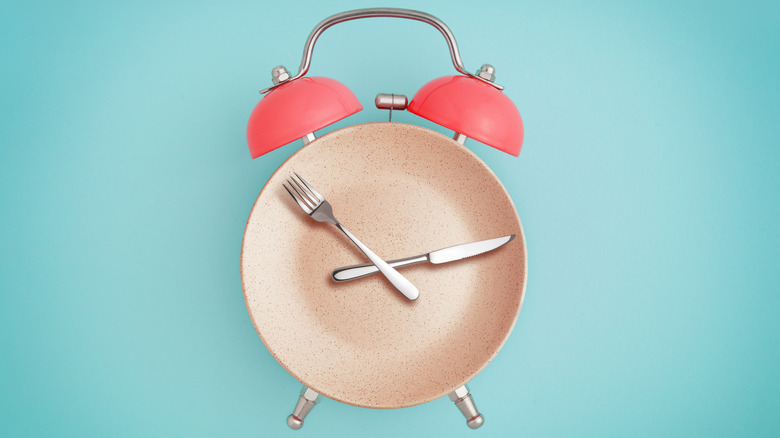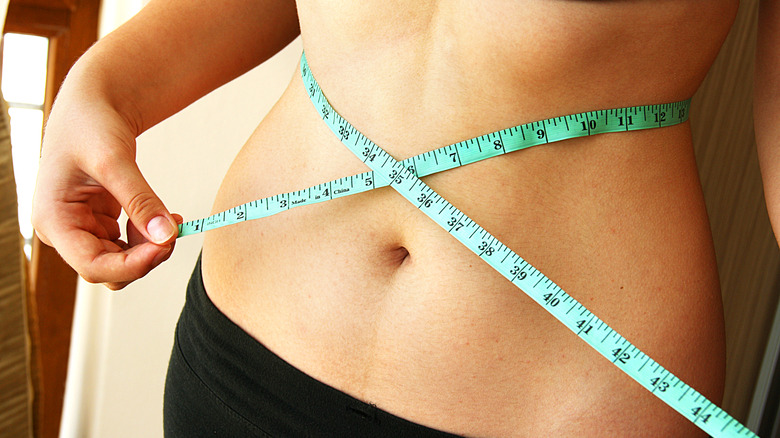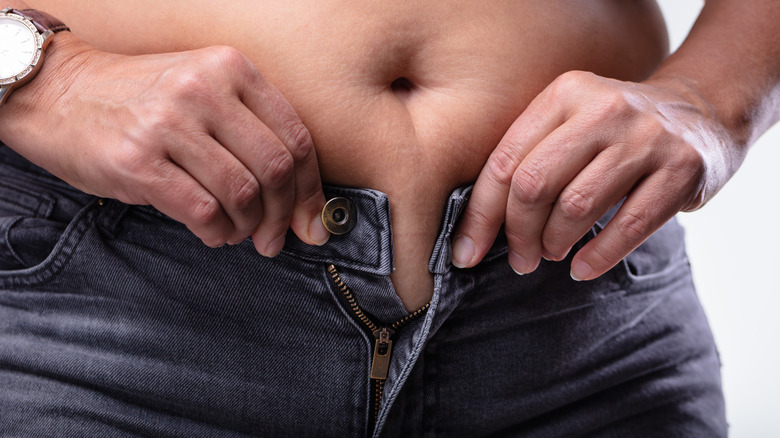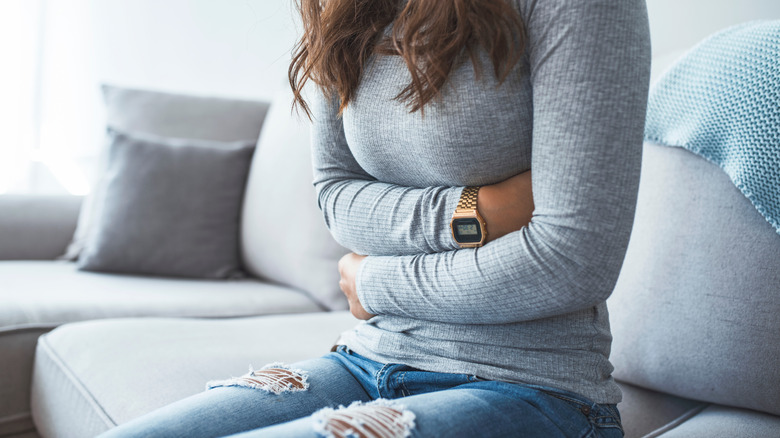What Really Happens To Your Body When You Skip Meals
It may seem like no big deal to skip meals a couple times a week or forgo having lunch when you plan to eat a big dinner, but that couldn't be further from the truth. Look at it this way: When your car runs out of gas, where can it go? Nowhere. When your cell phone runs out of juice, who can you call? No one. When a light bulb burns out, what can it illuminate? You get the point. Our bodies react in much the same way when we don't provide them with a proper source of energy, e.g. food.
It's important to note that skipping meals is not the same as intermittent fasting, which "can have incredible health benefits," registered dietitian and author of The Diet Detox, Brook Alpert, explained to Prevention. Skipping meals — whether out of convenience or in an effort to lose weight or restrict calories— can be extremely harmful. According to the experts, this is what happens to your body when you start skipping meals, which is just one of many everyday habits that could ruin your health.
If you skip meals, you could potentially develop an eating disorder
The Mayo Clinic defines eating disorders as "serious conditions related to persistent eating behaviors that negatively impact your health, your emotions and your ability to function in important areas of life." Typically, these disorders "involve focusing too much on your weight, body shape and food, leading to dangerous eating behaviors." Skipping meals is one such dangerous behavior. And, while it's considered a "red flag" if you skip meals, as it could indicate an eating disorder, it can also be a precursor of anorexia nervosa.
"One skipped meal every now and then leads to a skipped meal every day, which leads to skipped meals multiple times per day," Michael Doehla, a nutrition specialist and founder and CEO of Stronger U Nutrition, explained to The List. "At some point anorexia may be diagnosed and the individual would have to undergo treatment to not only literally save their life, but to then work to repair their relationship with food."
You may lose your ability to focus if you skip meals
Skipping just one meal sets off a chain reaction within your body. "First, your blood sugar decreases, which causes interruption in your ability to think straight," Haley Robinson, a clinical dietitian, told Piedmont Healthcare. "The brain uses glucose to run efficiently and if there is not enough glucose for the brain to use, your body does not function at 100 percent."
Registered dietitian and manager of wellness nutrition services at the Cleveland Clinic, Kristin Kirkpatrick, put it this way when speaking to Seventeen: "Your brain runs primarily on glucose. When there isn't enough sugar in your blood to pull from, you lose your ability to focus."
This is why it's especially important to eat in the mornings. "Breakfast is often known as 'breaking the fast' and is important to give the body and brain the initial fuel to start the day," Kendra Grinde-Busalacchi, a registered dietitian nutritionist and certified diabetes educator at California's Sharp Grossmont Hospital, told U.S. News & World Report. According to experts, you should aim to eat within one-and-a-half hours of waking up. Want to make a change? Try this list of the only breakfast recipes you'll ever need.
If you skip meals, it could put you into car accident mode
In the absence of food, the body attempts to problem-solve. "If the body does not receive this fuel in the morning, it needs to create its own fuel by releasing blood sugar into the bloodstream, causing blood glucose to increase," Kendra Grinde-Busalacchi, a registered dietitian nutritionist and certified diabetes educator at Sharp Grossmont Hospital in La Mesa, Calif., told U.S. News & World Report.
Then, your body will start to up its production of cortisol, a stress hormone. This combo of increased cortisol and a blood sugar spike can actually lead you to feeling like you've been in a car accident. "When you get in a car accident, you need a high amount of sugar in your bloodstream in case you need to lift a car off your companion," Jen Landa, chief medical officer of BodyLogicMD, explained to Daily Burn about skipping meals. "But the problem is that many are living at 80 percent 'car accident' [mode] all the time, and having a stress response going on chronically becomes dysfunctional."
You'll experience some seriously bad moods if you skip meals
When the body's stress response is activated after skipping a meal, you can "start to feel jittery and anxious," Kimberli McCallum, a psychiatrist based in St. Louis, Mo., revealed to Seventeen.
In addition, you'll experience some real-deal crankiness thanks to a lack of glucose. "Glucose is the number one fuel for our brains so when we don't have it, it can put us in a very bad mood," Frances Largeman-Roth, registered dietitian nutritionist and author of Eating in Color, told Prevention.
If you've ever waited too long before eating, you know what it's like to be hungry and angry. That is, "hangry." At this stage, you may give way to some uncharacteristic outbursts or full-on tantrums. This is only going to get worse the longer you go without food. "The lower your blood sugar goes, the hangrier you are. It's our body's defense mechanism to get food ASAP," Deena Adimoolam, an assistant professor in the Division of Endocrinology, Diabetes, and Bone Disease at the Icahn School of Medicine at Mount Sinai in New York City, told Health.
Skipping meals may contribute to unhealthy weight loss
"One of the most common misconceptions about skipping meals is that by skipping meals, you save on calories and ultimately lose weight. Unfortunately, it's not that simple," Lindsay Salvatore, a registered dietician at Woodbine Developmental Center in New Jersey, told The List.
According to the National Health Service, it is true that to lose weight you have to reduce your intake of calories — while also upping the calories you burn through exercise. "But skipping meals altogether can result in tiredness and may mean you miss out on essential nutrients," the organization cautioned.
"Going long periods without any food can [also] cause muscle breakdown aka catabolism," Michael Doehla, a nutrition specialist and founder and CEO of Stronger U Nutrition, explained to The List about what happens when a person chooses to skip meals. "Long term damage can be lowered muscle mass, which can increase fat stores, which can lead to a number of health issues." Although you may spot some initial weight loss, your body is producing more fat to protect it against muscle loss.
If you skip meals, you'll force your body into survival mode
The process of catabolism is a major part of the larger bodily process known as metabolism. Although "metabolism" is a word you've probably heard countless times, you may be surprised to learn just how vital metabolism is for living. In fact, the term is defined as "the chemical processes that occur within a living organism in order to maintain life." When you skip meals, the ability to literally maintain life is threatened.
"Our bodies are programmed to survive at all costs," Kristin Kirkpatrick, registered dietitian and manager of wellness nutrition services at the Cleveland Clinic, told Seventeen. "It dates back to caveman days: If a caveman was in the forest and all his food ran out, his body would lower his metabolism — so he wouldn't need as many calories to stay alive."
This is a fail-safe, of course, but the body can't differentiate between you purposely skipping breakfast and you not being able to find food at all. Thus, when you "skip a meal or go a long time without eating," your body is forced into "survival mode," according to Haley Robinson, a clinical dietitian.
Short on time in the morning? Follow some breakfast recipes you can make the night before.
You could gain weight by deciding to skip meals
While skipping meals can cause initial weight loss, weight gain is likely to follow. "[Survival mode] causes your cells and body to crave food which causes you to eat a lot," clinical dietitian Haley Robinson told Piedmont Healthcare. "We usually tend to crave unhealthy foods and all attempts at eating healthy go out the door. When you are that hungry, anything goes."
Skipping meals has, indeed, been found to lead to overeating, which also spells weight gain, according to a study published in the Journal of Nutritional Biochemistry. Additionally, the American Heart Association has determined that it's common for those who skip meals during the day to eat larger meals in the evening, which can cause higher BMIs.
And then there's the issue of not just gaining weight, but fat in particular. "When you start to eat normally again, you gain weight in the form of fat," Lindsay Salvatore, a registered dietician at Woodbine Developmental Center in New Jersey, confirmed to The List. "So you're really setting yourself back."
If you skip meals, it will be difficult to maintain your weight
Just as the choice to skip meals is not recommended and is not helpful for weight loss, it's also not a good idea to start skipping meals as a way to maintain your weight. Citing studies from the National Weight Control Registry, registered dietitian Molly Gee of the department of medicine at the Baylor College of Medicine in Houston, Texas revealed to Everyday Health that people who were able to lose up to 72 pounds and maintain that weight loss for five or more years were found to have a couple things in common. According to Gee, they were more likely to eat breakfast everyday and were more likely to keep a stable eating pattern across every day of the week.
Skipping meals, especially breakfast (which has a secret history most don't know about), is bad for weight maintenance for many of the same reasons it's bad for weight loss. "Hunger can be a powerful trigger to eat and overeat," the dietitian explained to the publication. She added, "It's difficult to get in all the necessary nutrients without including breakfast." So try having some fruit or oatmeal in the morning — that's what healthy people eat for breakfast.
If you skip meals, prepare to experience hunger breath
Although you can probably think of more than a handful of foods that cause bad breath — onions and garlic, we're looking at you — certain types of diets can also lead to the condition known as "hunger breath."
Diets that are low in carbs can cause hunger breath due to forcing the body into ketosis, which is, as doctors Mehmet Oz and Mike Roizen explained in an article for The Denver Post, a "chemical reaction that leaves your breath with either an odd fruits-and-nuts odor (not unlike perfume worn by your least-favorite aunt) or smelling like nail polish remover, never a come-hither scent."
It's not just low-carb diets that spawn hunger breath, though. In fact, it's more commonly the result of something else. "It's usually caused by regularly skipping meals," the doctors revealed. "Not eating reduces the amount of saliva in your mouth, and a dry mouth is like a Playboy mansion for randy bacteria that are looking to go forth and multiply. When they do, they let fly a sulfuric stench." Yep, skipping meals could ultimately be the reason you have bad breath.
Your hair and skin may dull if you skip meals
The condition of your hair and skin can speak volumes. "Any time you're significantly reducing calories, you're also reducing the essential nutrients you need to keep your hair shiny and your skin radiant," registered dietitian and manager of wellness nutrition services at the Cleveland Clinic Kristin Kirkpatrick explained to Seventeen.
Although you may think downing a multivitamin and continuing to skip breakfast daily will negate the problem, there's no substitute for food. As the publication stated, "You'll still be lacking protein, which is pretty much the building block of your prettiest parts. (Plus so many vitamins are fat-soluble, which basically means your body can't use them if you aren't getting enough fat in your diet.)"
Skipping meals, especially breakfast, can also lead to hair loss. Philip Kingsley, consultant trichologist, told the Daily Mail that not eating enough protein affects your keratin levels. Without keratin, your hair will not only become weak, it will stop growing altogether. For your hair's health, Kingsley said breakfast is a must.
You may get headaches or migraines if you skip meals
While there are a number of things that can potentially trigger migraines, skipping meals is a "well-characterized migraine [trigger]," according to a study conducted by the Institute of Neurological Sciences and Psychiatry at Hacettepe University in Turkey. Although it's not known exactly why skipping meals leads to migraines, the researchers hypothesized that it is related to an "insufficient supply of glycogen-derived glucose."
Regardless, the best thing you can do if you suffer migraines from a decision to skip meals is to, naturally, stop skipping meals. WebMD suggests pairing eating regularly with getting an adequate amount of rest. "Don't plan a day where you won't have time to eat," the publication stated. "Too much or not enough sleep can also bring on a headache. Be sure to get the right amount." In addition to migraines, skipping meals can cause headaches, according to The Migraine Trust. "Even delayed or irregular meals can make a difference," the organization noted.
You'll be more prone to these diseases if you skip meals
Skipping meals not only wreaks temporary havoc on your body and mind, but its longtime effects are also being realized. A study conducted by researchers at Harvard University, as reported by Reader's Digest, found that men who skipped breakfast were at a 27 percent greater risk of developing heart disease or having a heart attack when compared to those who ate breakfast. Christian J. Gastelum, an endocrinologist at PIH Health in Whittier, Calif., explained further, telling Reader's Digest, "The changes in hormones to help maintain blood sugar levels and the trend toward weight gain in patients who skip breakfast has been linked to heart disease."
If you skip meals, you can also increase your risk of developing type 2 diabetes. "Skipping the morning meal is linked with impaired glucose tolerance and that is further associated with the development of prediabetes and diabetes," Gastelum went on.
Your body will lose its ability to endure exercise if you skip meals
Although some may skip meals in an ill-advised attempt to lose weight, exercise is another important component of weight loss as well as healthy living. And, as it turns out, skipping meals will actually impede one's ability to exercise.
Without enough protein, your energy is zapped. And, without energy, working out becomes difficult if not nearly impossible. "Skipping meals doesn't only affect the nutrients you consume, but your ability to exercise and lead a healthy life," Lauren Harris-Pincus, registered dietitian nutritionist and owner of Nutrition Starring You, told Self.
Missing out on essential calories and nutrients increases a person's sluggishness, reduces the amount of energy supplied to the muscles, and can even increase the risk for passing out and/or injuring oneself, Jacqueline Berning, a registered dietitian and assistant professor at the University of Colorado, told the San Francisco Chronicle. As such, athletes will experience poor performance if they skip meals.
Your gut will eventually stop working well if you skip meals
Skipping meals can spell a whole lot of trouble for your insides. "Eating stimulates the reflex that causes waste to move forward in the bowel," Sharecare explained. "Missing meals decreases this movement." This creates constipation. "Eventually," Kimberli McCallum, a psychiatrist in St. Louis, Mo., detailed to Seventeen, "the gut stops working as well."
Although Joanne Arena, a registered dietitian, revealed on her site that constipation is "one of the biggest complaints" she receives from people who skip meals, it isn't the only intestinal issue you could experience. "In addition to constipation, lots of people who skip meals and then eat tend to complain of feeling bloated and gassy, or even having stomach pains," the expert went on.
Yes, if you skip meals, you could experience some seriously disastrous consequences to your belly, your brain, and pretty much everywhere in between.














